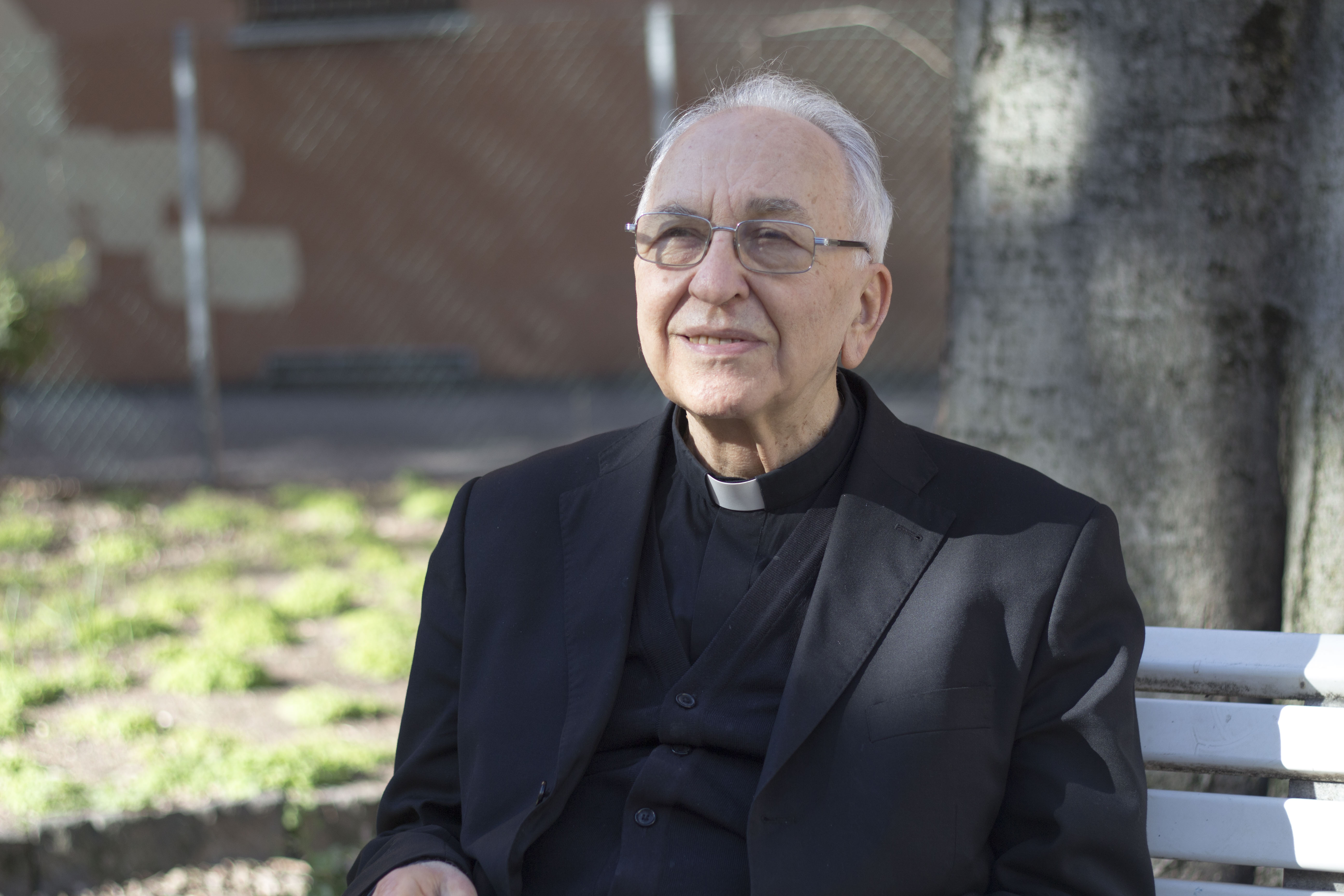The dream
My greatest dream: myriads of primary charismatic expanding cores. There is no other way for the new evangelization. And it is easier than it may seem.
It is only necessary to introduce the beauty of the Gospel, when it has been seriously taken, as an answer to Jesus’ calling (baptism is vocational) in communion with other’s hearts. There is a need to propose a choice out of which the Gospel does not bear fruit.
Wherever there are three or more Catholics, a path of holiness should flourish. St. Josemaría saw a magnificent horizon: “A secret. – A secret in a loud voice: these world crises are a crisis of saints. – God wants a handful of “his” men in every human activity. – Then … “Pax Christi in the Kingdom Christi” – the peace of Christ in the kingdom of Christ (The Way 301).
Holiness is not communal but not even individual: it is always in primary charismatic communion. That “fist” of “his” men clearly indicates this communion wherever there are Christians in the midst of the world. And do not think of a closed group of initiates, but of a communion of love for divine grace and mercy open to all.
Blessed Giuseppe Toniolo had a bright intuition: when Marx-Leninism will fall, the true revolution will be made by a community of saints. Indeed, many young Communists have given an example of primary belonging until death: for a tragic cause. We have the most beautiful and important cause, but very little primary belonging, without which there is no cause.


The fruitfulness of the founders of religious orders, of charismatic realities among the laity, flourished in the last century, is impressive, but it is good to realize that even in the Gospel communities, in the sects of all kinds, in the ideological parties the recruiting efficiency is improving, which deserves a better scope: we must understand that they have found an effective way to propose a radical choice. In order for this to spread among all Christians, bishops should think on how it is possible and also easy to propose the Christian choice in all parishes. Such mission requires to be aware of being loved, and called by Christ to follow, through a path of holiness, in primary charismatic communion and with a missionary mandate.
Without such five elements there is no living Gospel, but only a little religiousness.
In an interview, Archbishop Fernando Ocariz, recently appointed by Pope Francis as the prelature of Opus Dei, answered the question regarding what he would want for the Church at this time: “living the whole Gospel”. Indeed, but to live the Gospel requires the five above-mentioned things. But it is necessary to say it clearly and propose it through facts, together with others, to anyone who wants to be consistent with being called a Christian.
My “dream” is explained in the two following books: Nuova evangelizzazione e comunione primaria in parrocchia and Comunione carismatica in parrocchia.
Everyone knows what are human love, friendship, Christian communion, holiness, etc.; but then, if one checks, only 5 to 10% really know. As one who knows of the existence of Florence, but is not reflexive nor familiar with it, and becomes aware of this the first time he travels to Florence without the navigator.
It is impressive the little reflection on Christian communion made by bishops and priests . They ignore that everyone has a primary membership outside the Church and that this membership prevents them from seizing the catechetical exhortations in life. They do not know that the Church can have primary membership but only socio-sacral membership. They do not know that there is an abysmal difference between a socio-religious affiliation and a charismatic primary affiliation (that of Pentecost with the new commandment), and above all, that it is necessary to promote a real path, even with few, as a beginning, Choice of the sequel of Jesus in primary communion with the brothers. And yet it is not enough: there is a need for reflection on how to set a path of holiness and how to carry it forward so that the institution and responsibility of the pastors does not choke the communion and the primacy of the person.
In almost all of my books, I stress the problem of the underlying paradigm in which everyone moves, but I can say that, in facts, it is hard to find someone who becomes enough aware of it.
We are all part of a primary context of belonging, but virtually no one is sufficiently aware of it. Just like the fish that see rocks and algae, small fish to eat and big fish to avoid, but they do not see the water!
This is the first reflection. Hence the possibility of a more constructive dialogue with relativistic “churches” that now infest the Western world. We have been fighting Protestantism for four hundred years. Then it was understood that people and their social belonging must be respected: hence ecumenism was born.
New evangelization requires that everyone is persuaded to think without reason but with the heart, always in defense of a personal image of power within a primary belonging, which can be an ideological party, a meaningful social network, a sect or a religious community, a group of peers among young people, etc.. Political correctness is dictated by the need for consensus within a primary social group (from which to draw a sense of life).
New evangelization has two fronts: the first is towards culture. Evangelization cannot be new to the Gospel, but it must break through the cultural colt that has settled in the West, where every gnosis and every heresy have been able to corrupt some concepts. Here I refer to my article on this website: Le seduzioni di una cultura gnostica. Today, if the pulpit preaches with regard to freedom, it is understood as told by Pannella (without moral constraints to hold love free!). If we talk about justice, it is according to the Marxist heresy: people are all equal. From where unprecedented perversity was born and equal feminism that destroyed countless families. And what does it mean when preaching love or happiness? Everything except what will bring true love and true happiness. You cannot convince the relativists of their mistakes, but it would be a big step forward if relativists or other rationalists recognized that they are at least fundamentalists as they believe Catholics are. After that, we could try to respect and confront each other on cultural and social improvements.
The second reflection concerns the other face of the new evangelization: to make the Gospel flourish within the Church. In order to achieve this, it is necessary to reflect on the fact that from Constantine onwards the institutional Church preached the faith, but offered only a Christian practice of religious form, leaving the charism of faith alive to religious vows and, lately, to various charismatic realities highly fertile.
There always have been few cases of holiness among the people, but basically the Gospel was relegated out of the world, out of the real lives of families and peoples. I discuss such topic in the book: “Il male più grande” and in the two books for the parishes mentioned above. The world and the history of men have really been abandoned. It seems that being Christians is a project on the risen Christ, with no link to the human problems. But if we look at how a primary membership faces any obstacle, we can understand that there is no obstacle in the world that can prevent the Gospel from happening if one wants to follow Jesus, walking with our whole heart in communion with well-identified brothers, notwithstanding the normality of lay life which is not compatible with the social visibility of particular religious affiliations.
To bring the Gospel back to the world, it is necessary to meditate on the type of primary belonging within the Church.
Many practicing Christians do not have a primary membership within the Church, but in the social image, which makes them sensitized to every success or failure and to the full extent of the Gospel and also of the official religion as the primary bond. Among those who genuinely want to be Christians, many have an institutional, socio-sacral membership. The priestly presbytery for centuries has provided a surely primary but hierarchical-institutional link. The charism was left to the religious clergy and to those priests who sought food for their faith, with a desire for holiness. At this level, the Gospel does not work in the hearts of men. It is necessary to distinguish in Christianity the faith experienced through religious practice, as I do in the book “Saper di Amore”.
One can understand that for centuries the Gospel has been preached, but only a religious practice has been offered, where God remains outside, sought through sacred mediation. The sacred in Christianity always wants us. Religion cannot be opposed to religion as some Protestants believed, but religion is not enough.
We need a communion in Christ at a charismatic, at a Pentecost level, at least in the intentions and in the reality of brothers who seek to love with all their heart and with the whole soul. Of all this, there is very little reflection, certainly not enough to become pastoral practice wherever there are three or more Christians. It is necessary to set up the institution for the service of the charism that will always need some institution. But if the institution separates itself from the charism or expands until suffocating the charism, the Gospel disappears from the world. In the book “Nuova evangelizzazione e comunione primaria in parrocchia “, I demonstrate that in all parishes there can and must be one or more charismatic primary communion, without the need to imitate movements, and without giving up the Gospel sine glossa. The parish priests answer all together that they have to deal with everyone, but they do not realize that they are open to everyone as a limitation of the requirements of the Gospel, even for those who may be almost all parishioners who would be willing to live by Christianity only that someone propose it to him as a real choice in the parish. And yet it would remain open to everyone in terms of the sacraments and religious dimension.
It is wrong to think that a charismatic communion is for an élite or for a few. It is not enough to realize that all those who have in fact found the way to engage the heart, both in charismatic terms ,with many founders of religious orders or movements, but also at the ideological or sect or evangelical communities level, and they are highly fertile among peoples of all levels. The Communists hugged with the heart millions of young people, ignorant and intellectuals. The Gospel is far more beautiful than the Manifesto of the Proletariat.
Thus, this type of reflection is linked to reflexivity on how founders and ideologues, sects and communities of all kinds act in order to involve so many people wholeheartedly. In fact, it can be said that even the founders do not have enough reflection on the difference between their way of proposing an ecclesial path to respect and what the church institution has always done at the socio-sacral level. Perhaps Giussani is the founder who moved closer to a sufficient reflection on what he has done with great fertility. But not him has enough reflectiveness. Saint John Paul II has left us a wonderful document, the “Novo millennio ineunte”, that points to the universal calling to holiness, in primary communion (Spirituality of Communion). Certainly St. John Paul II was the Pope who most favoured charismatic realities, also because in fact, as a priest and as a bishop, he led a primary charismatic group, who followed him until the end of his life, despite the fact that he left Poland. But precisely in his paper, there is a lack of reflectiveness on how to obtain a path of holiness with spirituality of communion (the two pillars of the “Novo millennio ineunte”) in every place where Christians gather. So that stupendous document has remained sterile, like the countless documents of the Hierarchy. Exhortations are not enough, what changes life is belonging.
On the concrete way to proceed to propose to anyone who wishes to be Christian a path of holiness click here.
All the above deserves study and reflection, debate and experimentation. In my books there are quite concrete and operational indications.
Finally, there is a need for reflectiveness on how to lead a path of holiness over time. The great founders have left great rules, but almost never enough reflection on how to subordinate the institution to charisma. As I spell out in my books, the devil uses the hierarchical responsibility to suffocate charity. You can see the final part of “ Liberare l’Amore“ and the specific book “Comunione carismatica in parrocchia”. The latter is preceded by the introduction of Bishop Luciano Monari, Bishop of Brescia, given below.
You can read the introduction to the book “Comunione carismatica in parrocchia” written by Bishop Luciano Monari, Bishop of Brescia by clicking here.
You can read the article “Un kerigma coinvolgente” by clicking here.
In “Amoris Laetitia” Pope Francis insists on accompaniment not only as a personal commitment of a priest, but as a path of communion that sustains every difficulty. Nevertheless, looking at all references it does not seem that there is enough reflectiveness on the fact that in parishes there is usually no real communion in Christ. The need to start a process has often been claimed, but it is by no means clear that such process becomes really effective only if we are all invited to walk together, in a charismatic primary communion.
An interesting proposal parallel to my dream, even if with important differences, is the Benedict option.

